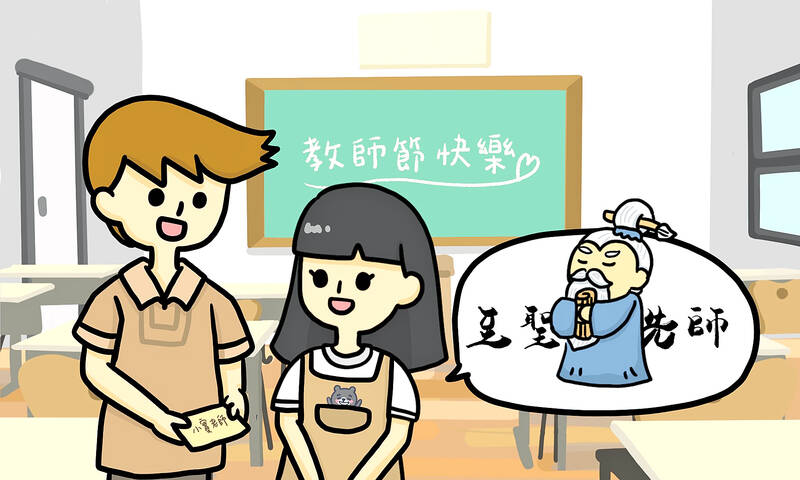對話 Dialogue
馬克:小實,這張卡片給你,祝你「教師節快樂」!

Mǎkè: Xiǎoshí, zhè zhāng kǎpiàn gěi nǐ, zhù nǐ “jiàoshī jié kuàilè!”
小實:咦?是給我的嗎?可是我不是你的老師啊!
Xiǎoshí: Yí? Shì gěi wǒ de ma? Kěshì wǒ búshì nǐ de lǎoshī a!
馬克:你教了我很多中文,所以你是我的中文老師。
Mǎkè: Nǐ jiāole wǒ hěnduō Zhōngwén, suǒyǐ nǐ shì wǒ de Zhōngwén lǎoshī.
小實:謝謝你這麼貼心!你怎麼知道教師節快到了?
Xiǎoshí: Xièxie nǐ zhème tiēxīn! Nǐ zěnme zhīdào jiàoshī jié kuài dào le?
馬克:是我的朋友告訴我的,他說九月二十八號是孔子的生日。
Mǎkè: Shì wǒ de péngyǒu gàosù wǒ de, tā shuō jiǔ yuè èrshíbā hào shì Kǒngzǐ de shēngrì.
小實:嗯,這是一種常見的說法。對了!美國也有教師節嗎?
Xiǎoshí: En, zhè shì yìzhǒng chángjiàn de shuōfǎ. Duìle! Měiguó yěyǒu jiàoshī jié ma?
馬克:有啊!美國的教師節在五月。
Mǎkè: Yǒu a! Měiguó de jiàoshī jié zài wǔ yuè.
小實:好,那我到時候也要好好感謝你常常教我英文。
Xiǎoshí: Hǎo, nà wǒ dào shíhòu yě yào hǎohǎo gǎnxiè nǐ chángcháng jiāo wǒ Yīngwén.
翻譯 Translation
Mark: Xiaoshi, this card is for you. “Happy Teachers’ Day!”
Xiaoshi: Huh...? Is it for me? But I am not your teacher!
Mark: You taught me a lot of Chinese, so you are my Chinese teacher.
Xiaoshi: Thank you for being so considerate! How do you know Teachers’ Day is coming?
Mark: My friend told me that Sept. 28 is Confucius’ birthday.
Xiaoshi: Well, this is a common saying. Oh, by the way, is there a Teachers’ Day in the US?
Mark: Yes! Teachers’ Day in the US falls in May.
Xiaoshi: OK, then I will also thank you for teaching me English.
單字片語 Vocabulary
1. 教師節 (jiàoshī jié) Teachers’ Day
2. 咦 (yí) huh
3. 貼心 (tiēxīn) to be thoughtful, considerate
4. 孔子 (Kǒngzǐ) Confucius
5. 常見 (chángjiàn) common
6. 說法 (shuōfǎ) statement, way of saying a story
7. 到時候 (dào shíhòu) by the time, then
8. 感謝 (gǎnxiè) grateful
教材音檔 Audio Files
教材影片 Video Files:
https://www.instagram.com/celc.nou_tw/guide/_/17999106352646292/
實踐大學華語中心提供
By Shih Chien University Chinese Language Center: https://chineseusc.com/

The Dutch introduced the Indian mango (Mangifera indica) to Taiwan in the 17th century. It is a green-skinned mango with thick fibers that get stuck in the teeth, but it boasts a rich aroma and a unique taste. In 1954, Taiwan’s Council of Agriculture introduced several mango cultivars from Florida, USA, including the Irwin, Haden, and Keitt varieties. After seven years of testing and domestication, the Irwin variety was chosen for promotion. Years later, the sample saplings started to bear fruit. These mangoes were large, with thin, vibrant red peels and golden pulp. The Irwin mangoes were mouth-wateringly sweet and

As the priest Antonius Hambroek stood in the dim chamber of Fort Zeelandia, his eldest daughter clung to him, her voice trembling. “Father, don’t go. They’ll kill you, and what will become of Mother and my sisters?” Outside, the sounds of Koxinga’s relentless canon siege boomed through the fortress. The defenders were on the brink of collapse. Starvation gnawed at their resolve, and the air carried the acrid stench of spent gunpowder and rotting flesh. Dutch reinforcements from Batavia had failed to arrive, leaving the garrison isolated and hopeless. Hambroek’s face was calm, though sorrow weighed heavily on his

對話 Dialogue 清清:今天中午我要多吃一點,不然晚上可能會吃不飽。 Qīngqing: Jīntiān zhōngwǔ wǒ yào duō chī yìdiǎn, bùrán wǎnshàng kěnéng huì chībùbǎo. 華華:怎麼了?為什麼會吃不飽? Huáhua: Zěnmele? Wèishénme huì chībùbǎo? 清清:今天大年初七,是「人日節」,傳統上結了婚的女兒要回家給父母送長壽麵,而且最好是素的,我姐姐會回來,只吃素麵,我應該很快就餓了。 Qīngqing: Jīntiān Dànián chūqī, shì “Rénrì jié,” chuántǒng shàng jiéle hūn de nǚ’ér yào huíjiā gěi fùmǔ sòng chángshòumiàn, érqiě zuìhǎo shì sù de, wǒ jiějie huì huílái, zhǐ chī sùmiàn, wǒ yīnggāi hěn kuài jiù èle. 華華:我還是第一次聽說有「人日節」呢!這是怎麼來的啊? Huáhua: Wǒ háishì dì yī cì tīngshuō yǒu “Rénrì jié” ne! Zhè shì zěnme lái de a? 清清:老一輩的人說,女媧是在第七天造出了「人」,所以今天可說是我們每個人的「生日」呢!生日快樂! Qīngqing: Lǎoyíbèi de rén shuō, Nǚwā shì zài dì qī tiān zào chūle “rén,” suǒyǐ jīntiān kěshuōshì wǒmen měi ge rén de “shēngrì” ne! Shēngrì kuàilè! 華華:你也是啊!欸?那前六天女媧都做了什麼呢? Huáhua: Nǐ yěshì a! Éi? Nà

As we bundle up in thick coats to stay warm during the winter, there is a population that has already adapted to extremely low temperatures. These people live in the remote city of Yakutsk, the coldest city on Earth. Yakutsk is situated in the heart of Siberia, which is the capital of the Sakha Republic in Russia. This historic mining city began to flourish in the 19th century following the discovery of gold deposits. Given its construction on permafrost, the average temperature in the city remains below 0°C for over half the year, with winter temperatures dropping to an astonishing -50°C.